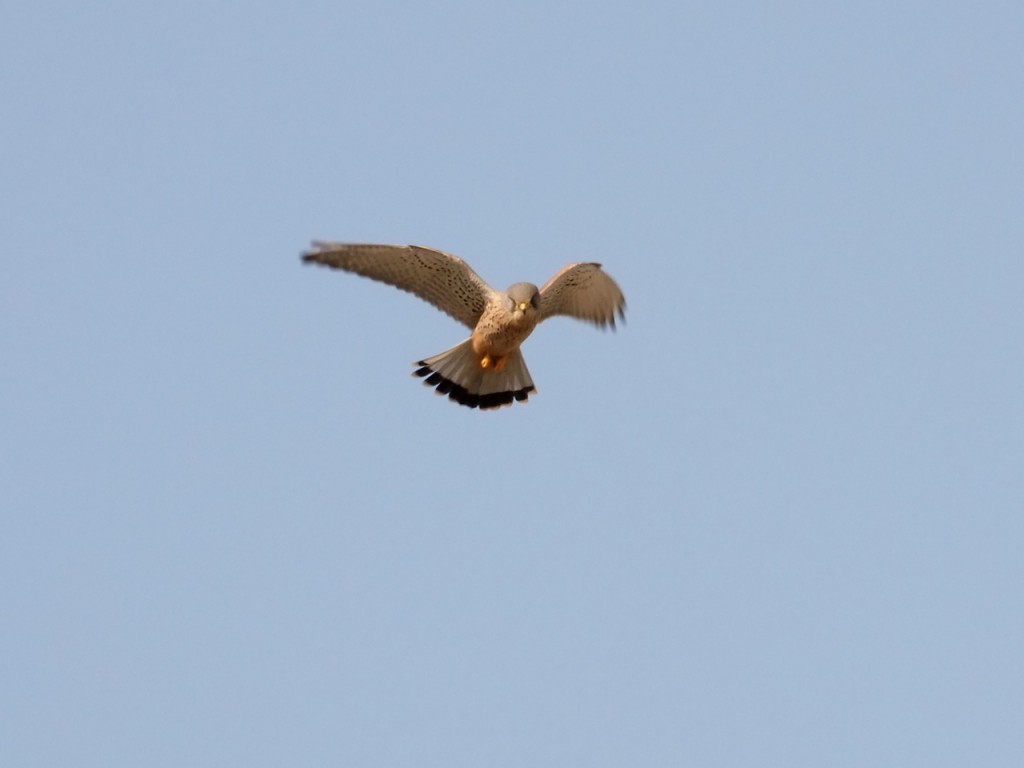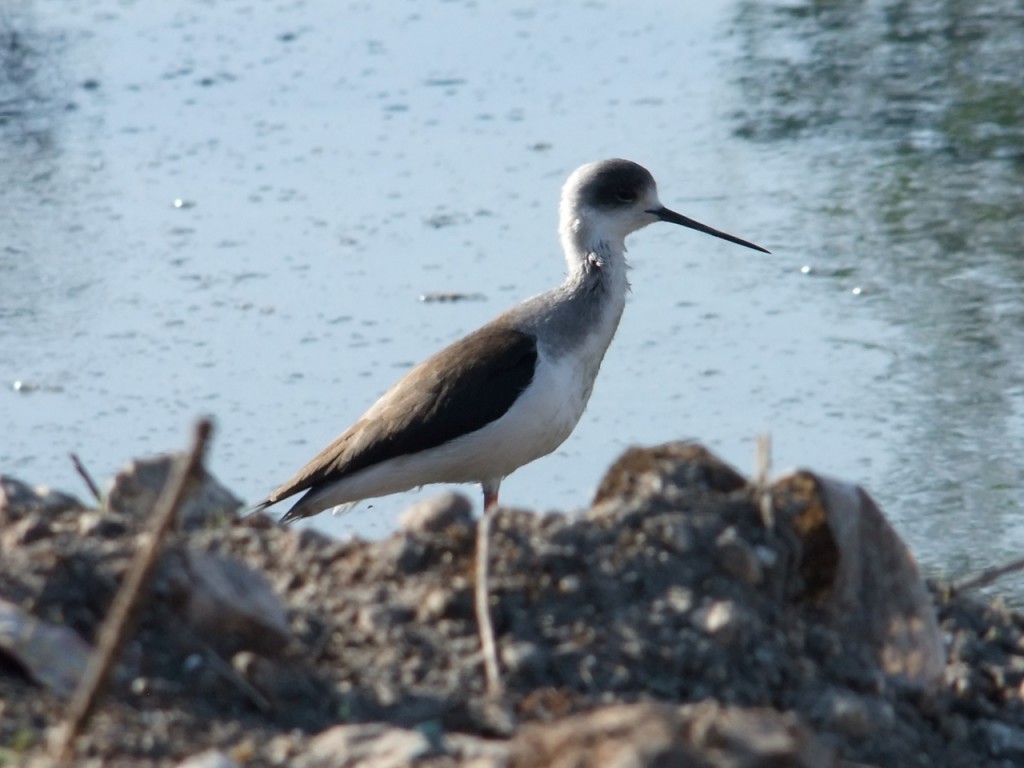
A Kestrel (Falco tinnunculus, from the falcon family), in the sky over Jenin. Photo copyright by Walid Basha. Used with permission.
Say “Jenin” to a friend and ask what word comes to mind. I’m guessing that word would not be “birdwatcher.” Unless, perhaps, you’d had the good fortune to meet Walid Salim Basha, microbiologist, university professor, environmentalist, and scientific and photographic observer of the great bird migration over the West Bank, especially in the Jenin governorate. “In the Holy Land, all birds migrating from Europe to Africa avoid passing over the Mediterranean, so they will pass over Palestine – more than 600 million birds will fly over Palestine during the year,” Walid told me as he navigated the crowded streets of Jenin in his old Opel. We were driving toward his house so he could show me photographs he took of 120 species of migratory birds in the Jenin mountains. “This year, over Jenin, I recorded more than 500 kites [a hawk-like bird of prey]. You have the white stork – we have thousands in Jenin, in the valley between Jenin and Nablus.”
I’d met Walid only a few minutes earlier, at the Al Kamandjati music center in Jenin, where his 11-year-old son Fadi is taking singing lessons with the British soprano, Julia Katarina. (My new book is about Al Kamandjati and the transformational power of music in the lives of children.) Fadi, who at this stage in life is also a soprano, has a strikingly powerful, clear voice, and was preparing for a performance of Italian arias for the Italian consulate in Bethlehem in a few days’ time. (Right; of course he was.) While Julia went upstairs to work with Fadi, Walid happened to mention his passion for birds, and soon he was inviting me back to the house to see the photos.
“Tell Julia I’ve kidnapped him,” Walid told Al Kamandjati staffer Reema Shriem, as we headed out the door. I raised my eyebrows. “In Jenin,” I said.
“I’m not a political guy,” said the professor of immunology and microbiology at An-Najah University in nearby Nablus, as we drove toward his house. “I love my science. I love my work.” Walid began his bird documentation not to seek or fulfill a grant project for an NGO – but just because he wanted to. “I believe in the NGIs,” he said. “Non-governmental individuals. We can do projects.”
We were stuck in traffic, and horns began blasting near the vegetable market in Old Jenin. “This is an Arabic tradition,” Walid said, laughing. “I was in Japan for six years” – working on his PhD and raising a family with his wife, Jameleh. “Fadikon” was born there and holds a Japanese passport. “In Japan we don’t use the horn. Not once in six years. Everything is going smoothly. No noise. Nobody steps in the street. When I came back here, in one day, I used it thousands of times!”
We rounded a corner as the muezzin was giving his call to prayer. Walid’s family is among only 400 Christians in Jenin, a town (and refugee camp) of more than 50,000. But he said the distinctions between Muslims and Christians are “meaningless, here in Jenin.” As a Christian schoolboy, Walid was not required to take Islamic studies as other students were. “But my dad emphasized that we should take these courses because we should know about our neighbors. It gives you more to understand the others. In general we don’t have any problems as Christians. We respect each other.”
Now we arrived at the house, and Walid ran in to retrieve his camera, where he’s stored hundreds of close-ups of migratory and local birds: Jays, robins, blackbirds, buzzards, owls; Turtle Dove, Palm Dove, Syrian Woodpecker, Yellow-vented Bulbul, Black Redstart, Stonechat, Chucker, Short-toed Eagle. “This is the white-chested kingfisher,” he said upon returning to the car, showing me the little screen on his Fuji. The bird sat on an electrical wire, a large lizard dangling from its beak. “And I was watching him enter the nest and give it to the babies.”

Bird on a wire: The White-breasted Kingfisher (Halcyon smyrnensis), and dinner for the family, on an electrical wire in Jenin. Photo copyright by Walid Basha. Used with permission.
“This is the Palestine Sunbird [Nectarina osea]. It’s black, but after the sunrise, it will become more blue, sometimes green, depending on the reflection of the light. It’s in an olive tree next to my house.”

A Palestine Sunbird (Nectarina osea), iridescent blue in this photograph, perched in an fig tree in Jenin. Photo copyright by Walid Basha. Used with permission.
He clicks forward. “And this is the white dove, migratory – it comes to Palestine in springtime.” The picture shows two doves together. “You know that if one of the couple dies, it will not marry again? It will spend all the life with one – they are not changing couples every year, like other birds.”

A pair of turtle doves (Streptopelia turtur) near Jenin. Photo copyright by Walid Basha. Used with permission.

A Black-winged Stilt (Himantopus himantopus) outside of Jenin. This is one of 120 species of migratory birds documented by Prof. Walid Salim Basha. Photo copyright by Walid Basha. Used with permission.
A couple of weeks later, my friend Nidal and I paid Walid and his family another visit. We sat on their comfortable third floor veranda, sipping tea. Fadi’s performance in front of the Italians in Bethlehem had been a big hit – so impressive that, after the performance, the diplomats began gushing to him in Italian, leaving it to Fadi’s uncle to break the news: Fadi may be able to beautifully sing Italian arias in a barely detectable accent, but he doesn’t speak the language.
As we spoke, Walid pulled out a royal blue sheet of origami paper and began making folds. He described the recent visit of the Japanese ambassador, who he showed all around Jenin. He was fond of escorting one recent Japanese diplomat, a fellow Catholic, to holy sites in the area, including the Church of the Nativity in Bethlehem, where they attended midnight and Easter masses.
Walid’s fingers worked the folds of his origami. He was making a crane. “There is a tradition in Japan – if you do 1000 cranes, all of your dreams will come true.” Suddenly he said: “In Japan, we used to go fishing. I miss fishing a lot. I hope they open Gaza so I can go there.” Lately, moving around has become increasingly problematic. In 1993, at the start of the Oslo “peace process,” he would travel from the West Bank to Haifa without problem. “Now I need a permit and a magnetic card. If you want to cross the border, you will take hours just to make your decision.” Jameleh suggested Walid’s love for birds, especially those in flight, has a deeper meaning.
Walid returned his attention to his crane. Today the bird man of Jenin gives workshops on origami to kindergarten teachers here. He tells them of the promise of 1000 cranes. After the atomic bomb was dropped on Hiroshima, he said, a young girl with leukemia tried to make 1000 cranes, in a dream to save her own life. She got as far as 680; after her death, her friends and family finished the job. Today, Walid is organizing a 1000 cranes project at Fadi’s school. “We will collect the 1000 cranes, and send them to Japan,” he said.
Now he is finished with the blue crane. It’s simple and beautiful. Walid smiles, and reaches out, crane between his fingers, to offer it to Nidal.


This is a beautiful story, Sandy. Thank you. I love that kingfisher/lizard photo.
REPLY:Dear Martine, thanks for your cmmneot. We would love to invite you to Jenin, to see what we are doing in Jenin and to meet Ismael, the father and also Fakhri, one of the wonderful founders of the idea to rebuild cinema jenin. I see a slight, but real chance that Cinema Jenin could succeed in bringing people together. Thats what it is all about. In october the 3D movie Conference of the animals will be cinematiquely released in Germany by Constantin Film. I love this book by Erich K stner. We are talking right now to Constantin Film to get the rights for synchronizing this film with actors from Jenin and the arab world into arababic and to premier it at our first Int. Filmfestival in Jenin in april 2011. This story fits so much for the region. Thanks Marcus
Sandy:
This is one of the best blogs about Palestine that I’ve read, a marrying of personal stories and political commentary. I hope Professor Basha soon experiences the freedom to cross borders and boundaries as easily as his birds do. I’m glad to hear there’s a new book in the offing. Congratulations!
Sandy, thank you for making us remember that Jenin, the West Bank, the Holy Land is more than just a conflict. That the land has birds, music and song, people with passion like Mr. Walid. I think we, bombarded by the bad news in the media, sometimes forget that. Take care, Gosia
am proud of that one day i met Dr. al-basha, he’s wonderfull not only from personal point of view, but also in the scientific side , he’s not only the bird man of Jenin, he’s the scientific man of jenin..in my openion, he’s a Wikipedia- in other expression- that you can find what you need . Dr.al-basha…..all my respects and regards,
Thank you for sharing this story. I wish those 1000 cranes work.
REPLY:Dear Martine, thanks for your comenmt. We would love to invite you to Jenin, to see what we are doing in Jenin and to meet Ismael, the father and also Fakhri, one of the wonderful founders of the idea to rebuild cinema jenin. I see a slight, but real chance that Cinema Jenin could succeed in bringing people together. Thats what it is all about. In october the 3D movie Conference of the animals will be cinematiquely released in Germany by Constantin Film. I love this book by Erich K stner. We are talking right now to Constantin Film to get the rights for synchronizing this film with actors from Jenin and the arab world into arababic and to premier it at our first Int. Filmfestival in Jenin in april 2011. This story fits so much for the region. Thanks Marcus
Interesting story and beautiful migratory birds in Jenin that I didn’t notice before. I heard Fadi singing three weeks ago for the first time and he had a very pleasant voice as he is still a kid. I hope him the best.
What a brilliant story. Many thanks to Susan Abuhalwa, founder of Playgrounds for Palestine, for twittering a link to this story.
Fine, it certainly is not which usually negative in the slightest degree — take a look at have various 100 % natural ingredients that can you can think about being a healthier facilitate for a weight loss. They’ve been well-known ( blank ) its Hoodia gordonii Gordonii, Green Tea, Chitosan, Hca, Fibers and many people… However a lot of them was not searched diligently to make sure you turn out to be their very own weight loss drives, they highlighted substantial efficaciousness a lot of unique persons utilizing them inside model of vitamin supplements and receiving favorable weight loss end results.
http://shareyourstory.org/webx?224@@30ed650@